In the space of the past twenty four hours, the wires have been humming with news of EU Commission’s launch of the Digital Skills and Jobs Coalition, Oracle’s donation of $1.4 billion to computer sciences and digital skills learning and the Mayor of London, Sadiq Khan, unveiling a £7m Digital Talent Programme to arm young Londoners with the skills they need to access jobs in the capital’s thriving digital, technology and creative industries.
It may be a coincidence that these stories, much to the chagrin of the respective PRs, have broken at the same time or it might simply be that the subject of Digital Skills is now main stream news.
I’d err with the later and it’s not before time that we elevated tech stories from the business pages to the front sections of our on and off line media.
Every single economic indicator, global or local, has been screaming for over a decade, since the mass deployment of broadband and mobile access technologies, that the next industrial revolution will be in the cloud and that the jobs of the future will require computing skills and yet we have somehow managed to ignore the signs.
In 2006 the world’s top six most valuable public companies included General Electric, Citigroup, BP & Royal Dutch Shell. Today these business have been replaced with Apple, Alphabet (Google), Amazon & Facebook. Only ExxonMobil and Microsoft, another tech giant, are common to both lists ten years on, giving credence to the saying that ‘data is the new oil’.
During this same period, Europe has seen demand for workers with computer science and coding skills grow by four percent each year, year on year, and with no sign of abatement.
Back in June of this year, The UK Government’s Science and Technology Committee published a report which frankly made depressing if inevitable reading. The report warns that the UK will need 745,000 extra digitally skilled workers, across all sectors, by 2017. As this wasn’t challenging enough, the report sets out the size of the task in plugging this skills gap, by revealing that 12.6 million adults in the UK lack basic digital skills; 5.8 million people have never used the internet; only 35% of computer teachers in schools have a relevant degree and computing science teacher recruitment sees a 30% shortfall.
If we just focused on Scotland, the figures would be just as shocking. 1 million Scots don’t have internet access. 30 per cent of the Scottish population lack basic digital skills. The number of computing teachers has fallen from 802 to 598 over the past ten years and 17% of secondary schools have no computing specialist. According to projections by Deloitte, Scotland is set to lose £9bn in potential gains over the next 15 years if it doesn’t adopt a visionary digital action plan.
And there we have the crux of the problem. Education in its broadest sense.
We are currently guilty of failing our young people and we are denying them one of the greatest gifts that we can bestow: opportunity. We are anchoring them at the wrong end of the technology food chain and in doing so we are damaging the economic and social prospects of our nations.
It’s not just the formal education system that is failing our young people but the support provided by parents and carers to them as they develop and make life choices.
What is the likelihood of a parent who has never used the internet suggesting to their son or daughter that they consider a career in data analytics or cyber security? I’m not a betting man but I reckon the odds would be pretty high.
At least in Scotland the Education system appears to have woken from its slumber and is starting to make positive changes. There is a recognition that computing science and digital subjects are vital and are now being placed at the heart of the curriculum, more specialist teachers are being recruited and classrooms are being upgraded with latest technology. But, to use an oil analogy again, the education system is one big tanker and it’s going to take time to turn it around.
Changing the perceptions and attitudes of parents and carers towards computing and digital careers on the other hand will take even longer. This is one of the reasons why it is so important that the main media channels, both on and offline, continue to promote the digital world and the opportunities it offers as mainstream at every turn. Oh if there is anyone reading this with TV commissioning responsibilities, please can we have some children’s programmes on computing and technology and the odd Data Centre Network engineer or App Designer wouldn’t go amiss in a soap or two.
So is it all doom and gloom? Have we really created a booming sector and somehow overlooked the development of the talent pipeline to fuel its continued growth?
Well Yes, the facts can’t be disputed, but on the other hand, what is now encouraging and apparent is that we (‘we’ being Government, Education and Industry) have finally recognised that there is a real issue to be addressed and that the time for rhetoric and spin is over and we now need action.
Over the past two years and since the publication of the tech sector Skills Investment Plan by Skills Development Scotland, the country has witnessed some real progress and managed some positive gains.
Only this week Edinburgh based CodeClan, the Digital Skills Academy that delivers intensive programming courses and helps people to reskill and move into the tech sector, celebrated its first birthday by announcing expansion plans into Glasgow. During its inaugural year 166 students have started the course, 101 have completed, with 59 ‘inflight’, and 80% of those who have completed the course are now in relevant jobs. An impressive start.
The DigitalWorld Campaign launched last year is a national initiative that inspires and supports people to go into digital technology careers. Over the past twelve months, using a mix of online and face to face, it has reached thousands of young people and, importantly, their parents, promoting technology and the attractiveness of the sector at every opportunity.
We are also beginning to truly harness and appreciate the power of ‘in work learning’ as we see more and more young people, supported by industry, seek internships and apprenticeships to help them ‘earn whilst they learn’ whilst gaining valuable skills and experience , for example through the highly successful e-placement Scotland programme.
And finally, we have at last woken up to the fact that we need to capture the hearts and minds of our young people long before they are in a position to select their subject choices at S3.
Today’s children are the first generation for whom technology is omnipresent -affecting every element of their lives from the moment they were born. Computational thinking as a skill has never been more needed and we’re seeing recognition of this reflected in preschool and primary services providing children with educational tools to encourage the development of computer and coding skills.
Another hugely positive development has been the acceptance of the importance of extracurricular activities to complement, in some cases filling a void, formal school activity.
The Digital Xtra Fund was created in May this year by the Scottish Government, who contributed £400,000 to fund extracurricular computing science and digital activities for under 16s across Scotland.
In its first year the Fund has supported a wide range of innovative projects that will directly reach over 15,000 young people across the country. Funded projects have included the training of public library employees to deliver Code Clubs to young people across 28 of the 32 Local Authority Library Services and the extension of the Apps for Good programme across Scotland. Apps for Good will now engage 2,500 young people and provide them with the opportunity to design, build, market and launch apps to solve problems in their communities.
It has to be recognised that what we are trying to achieve here is as much a cultural shift as it is simply a skills rebalance but we have at least started the journey. And it is a journey.
And if we are to continue on an upward path then it is essential that we (Government, Education, Industry) don’t sit back and wait for others to solve the problems. We all have the same goal and we will achieve it if we pool resources and work together.
Two of the initiatives mentioned – CodeClan and DigitalXtra Fund – need industry buy in if they are to succeed and continue to grow. CodeClan requires employer partners and DigitalXtra requires funds to continue to support innovative projects that can make a real difference to young Scot’s lives.
If you want to help the DigitalXtra Fund please CONTACT US NOW.
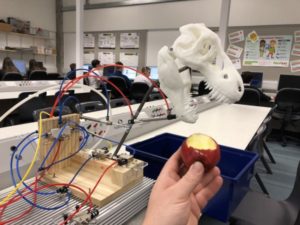 Angus Young Engineers (AYE) are an afterschool engineering education based charity, dedicated to steering young people into education and careers involving STEM. This year, with support from Digital Xtra Fund, AYE are building on the successful projects they have delivered since 2003, with the launch of The CAD/CAM Café, a programme to facilitate peer-to-peer learning at Forfar Academy and primary schools in the catchment area.
Angus Young Engineers (AYE) are an afterschool engineering education based charity, dedicated to steering young people into education and careers involving STEM. This year, with support from Digital Xtra Fund, AYE are building on the successful projects they have delivered since 2003, with the launch of The CAD/CAM Café, a programme to facilitate peer-to-peer learning at Forfar Academy and primary schools in the catchment area.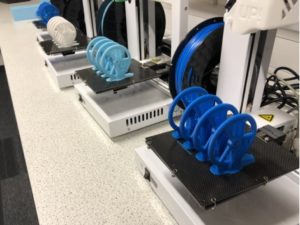 This year a group of 20 pupils aged 12-16 from Forfar Community campus will get the chance to take part in a programme of workshops on 3D Computer Aided Design and Manufacturing, 3D Scanning, and Digital Manufacturing using 3D printers and 2D laser cutters. Working in groups of four, the young participants will take on role play jobs that reflect the local industry. Supported by AYE’s industry mentors and STEM ambassadors, pupils will gain valuable employability skills as they progress through the 20 week programme – working towards certificates of Digital Manufacturing Confidence, with bronze awarded after 10 weeks, silver after 20 weeks of the programme, and the opportunity to achieve a gold award by acting as mentors and tutors to a local primary school.
This year a group of 20 pupils aged 12-16 from Forfar Community campus will get the chance to take part in a programme of workshops on 3D Computer Aided Design and Manufacturing, 3D Scanning, and Digital Manufacturing using 3D printers and 2D laser cutters. Working in groups of four, the young participants will take on role play jobs that reflect the local industry. Supported by AYE’s industry mentors and STEM ambassadors, pupils will gain valuable employability skills as they progress through the 20 week programme – working towards certificates of Digital Manufacturing Confidence, with bronze awarded after 10 weeks, silver after 20 weeks of the programme, and the opportunity to achieve a gold award by acting as mentors and tutors to a local primary school.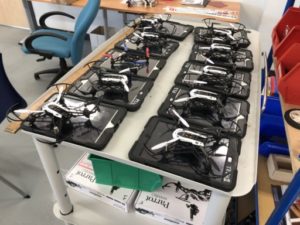 The second aspect of The CAD/CAM Café will see the 20 pupils from AYE introduce 230 P6 pupils in 3 urban and 5 rural primary schools to a 3D scanning and printing activity that the Café participants have been developing. Primary school pupils will work in groups to scan their peers’ heads to make 3D portraits, be introduced to 3D CAD, navigate Thingi-verse and 3D print an object to complete a design task to make a drone flight-ready. As with the Secondary school programme, pupils will have the opportunity to roleplay exciting real-life situations from the digital tech sector like designing and testing drones on missions to deliver antidotes to remote locations. Each group will work with a secondary school mentor who is working towards their Gold Digital Manufacturing Confidence certificate, with support from other Senior Young Engineers Leaders and the schools’ primary school transition programmes.
The second aspect of The CAD/CAM Café will see the 20 pupils from AYE introduce 230 P6 pupils in 3 urban and 5 rural primary schools to a 3D scanning and printing activity that the Café participants have been developing. Primary school pupils will work in groups to scan their peers’ heads to make 3D portraits, be introduced to 3D CAD, navigate Thingi-verse and 3D print an object to complete a design task to make a drone flight-ready. As with the Secondary school programme, pupils will have the opportunity to roleplay exciting real-life situations from the digital tech sector like designing and testing drones on missions to deliver antidotes to remote locations. Each group will work with a secondary school mentor who is working towards their Gold Digital Manufacturing Confidence certificate, with support from other Senior Young Engineers Leaders and the schools’ primary school transition programmes. AYE’s CAD/CAM Café is one of 11 initiatives supported by Digital Xtra Fund’s annual grant awards, contributing to our goal to give every young person in Scotland access to a digitally creative activity. These awards are made possible by the valued support of the Fund’s partners, sponsors and funders. To help us continue this work in 2018/19, find out more about supporting Digital Xtra Fund and inspiring Scotland’s digital future here.
AYE’s CAD/CAM Café is one of 11 initiatives supported by Digital Xtra Fund’s annual grant awards, contributing to our goal to give every young person in Scotland access to a digitally creative activity. These awards are made possible by the valued support of the Fund’s partners, sponsors and funders. To help us continue this work in 2018/19, find out more about supporting Digital Xtra Fund and inspiring Scotland’s digital future here.
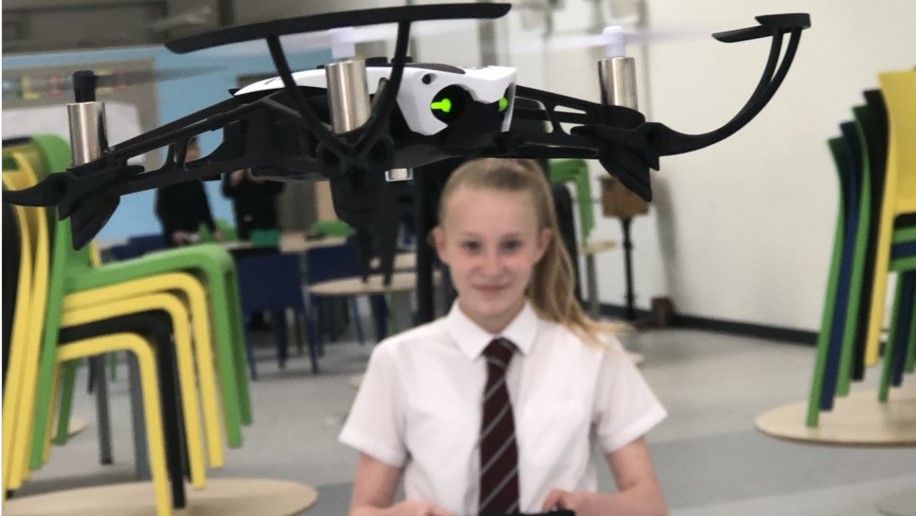
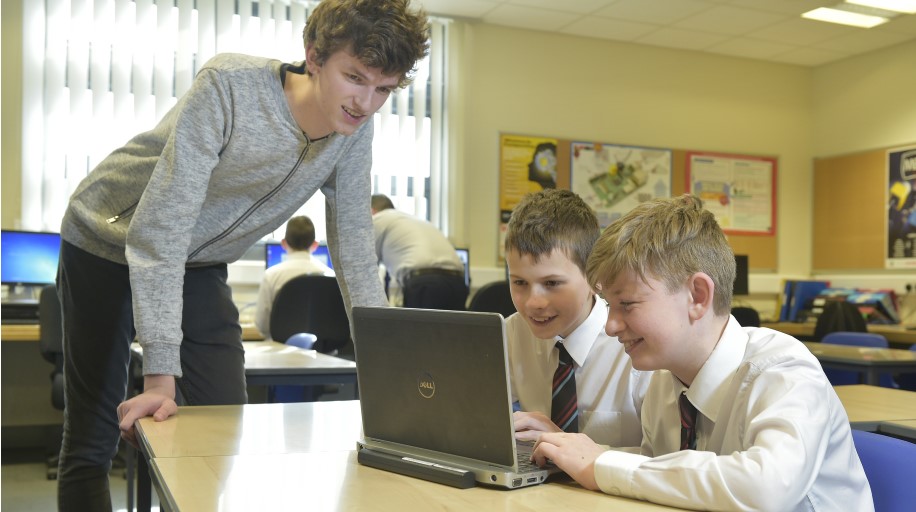
 The Renfrewshire Coding Clubs are aimed at S1 and S2 pupils who will soon be thinking about their elective subject choices. The afterschool Coding Clubs deliver activities in a fun and informal way that engages young people, builds their skills, and stimulates their interest in computing science and digital technologies. Senior staff from the College’s computing faculty work with a team of West College Scotland STEM Ambassadors to run the weekly clubs, recruited from the College’s HNC and HND students. This provides the students with a unique opportunity to share their knowledge and enthusiasm for computing science with school pupils, while giving the college students valuable work experience that supports their current studies and their future careers in STEM.
The Renfrewshire Coding Clubs are aimed at S1 and S2 pupils who will soon be thinking about their elective subject choices. The afterschool Coding Clubs deliver activities in a fun and informal way that engages young people, builds their skills, and stimulates their interest in computing science and digital technologies. Senior staff from the College’s computing faculty work with a team of West College Scotland STEM Ambassadors to run the weekly clubs, recruited from the College’s HNC and HND students. This provides the students with a unique opportunity to share their knowledge and enthusiasm for computing science with school pupils, while giving the college students valuable work experience that supports their current studies and their future careers in STEM. Alongside the Coding Clubs, West College Scotland has also delivered CPD sessions in association with Microsoft Education, Renfrewshire Council, and Paisley YMCA to Renfrewshire primary and secondary school teachers. Focused on increasing the teachers’ confidence and encouraging the use of coding in the classroom, these sessions are vital for the legacy of this project as these teachers will take over managing the current Coding Clubs, as well as initiating new ones, with the assistance of the STEM Ambassadors and senior school pupils. Additional support for the CPD sessions and Coding Clubs comes from
Alongside the Coding Clubs, West College Scotland has also delivered CPD sessions in association with Microsoft Education, Renfrewshire Council, and Paisley YMCA to Renfrewshire primary and secondary school teachers. Focused on increasing the teachers’ confidence and encouraging the use of coding in the classroom, these sessions are vital for the legacy of this project as these teachers will take over managing the current Coding Clubs, as well as initiating new ones, with the assistance of the STEM Ambassadors and senior school pupils. Additional support for the CPD sessions and Coding Clubs comes from  BT Scotland has supported Digital Xtra Fund since its launch, and its valuable support has allowed the Fund to inspire young people across Scotland with digital technologies. Brendan Dick, BT Scotland director, said: “BT is right behind Digital Xtra Fund because we believe every young Scot needs to learn digital skills as a basic along with reading and writing. West College Scotland coding clubs engage young people in a fun and informal way and it’s great that more S1 and 2 pupils are getting the chance to learn skills which could potentially lead to a career in digital technology. It’s vital that industry works with educators and the wider public sector to tackle the digital skills shortage and prepare young people for the future world of work.”
BT Scotland has supported Digital Xtra Fund since its launch, and its valuable support has allowed the Fund to inspire young people across Scotland with digital technologies. Brendan Dick, BT Scotland director, said: “BT is right behind Digital Xtra Fund because we believe every young Scot needs to learn digital skills as a basic along with reading and writing. West College Scotland coding clubs engage young people in a fun and informal way and it’s great that more S1 and 2 pupils are getting the chance to learn skills which could potentially lead to a career in digital technology. It’s vital that industry works with educators and the wider public sector to tackle the digital skills shortage and prepare young people for the future world of work.”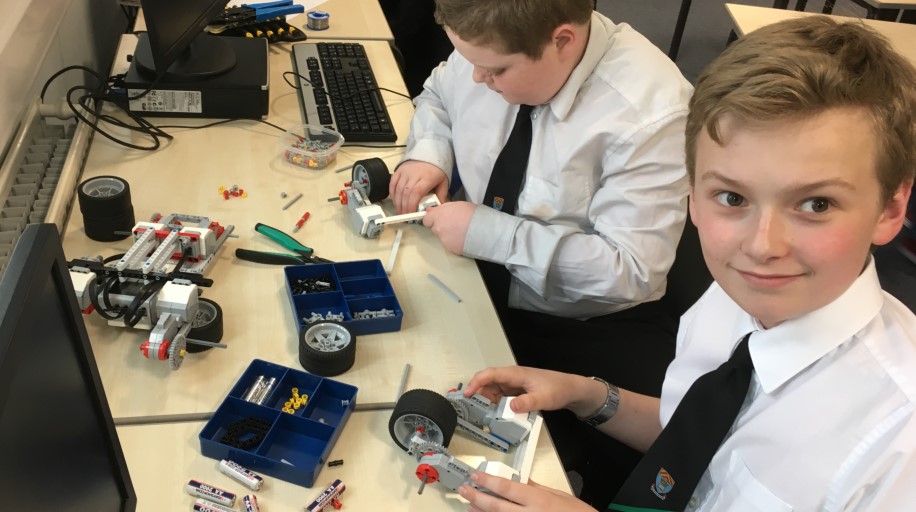
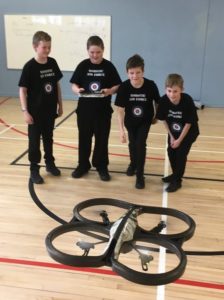 Continuing this diverse range of projects is McLaren High School’s STEM@McLaren Festival. This initiative is aimed at S3-S5 pupils at McLaren High School in Stirling, supporting them to design and build creative STEM (science, technology, engineering, and mathematics) projects which will be presented to industry experts and the general public at the school’s STEM Festival in Summer 2018. McLaren High School is the only secondary school in the Loch Lomond and Trossachs National Park and serves the largest rural catchment area in mainland Scotland.
Continuing this diverse range of projects is McLaren High School’s STEM@McLaren Festival. This initiative is aimed at S3-S5 pupils at McLaren High School in Stirling, supporting them to design and build creative STEM (science, technology, engineering, and mathematics) projects which will be presented to industry experts and the general public at the school’s STEM Festival in Summer 2018. McLaren High School is the only secondary school in the Loch Lomond and Trossachs National Park and serves the largest rural catchment area in mainland Scotland.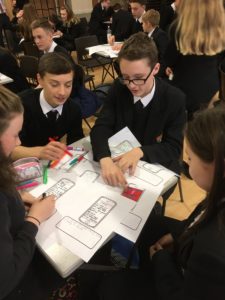 By encouraging young people to tackle complex problems by breaking them down into a series of smaller problems, these projects will teach computational thinking and design as a process. Participants are encouraged to work on their projects primarily in their own time but will also receive support and advice from industry experts and academics, giving them first-hand experience of planning and project management, alongside improving their communication skills, networking, resilience, judgement and decision making.
By encouraging young people to tackle complex problems by breaking them down into a series of smaller problems, these projects will teach computational thinking and design as a process. Participants are encouraged to work on their projects primarily in their own time but will also receive support and advice from industry experts and academics, giving them first-hand experience of planning and project management, alongside improving their communication skills, networking, resilience, judgement and decision making.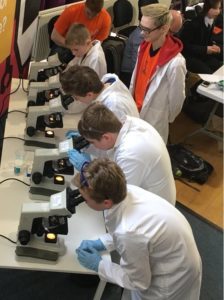 The STEM@McLaren Festival is one of 11 initiatives Digital Xtra Fund is supporting in 2018. This is made possible by our sponsors and funders who contribute to our goal of giving every young person in Scotland access to a digitally creative activity.
The STEM@McLaren Festival is one of 11 initiatives Digital Xtra Fund is supporting in 2018. This is made possible by our sponsors and funders who contribute to our goal of giving every young person in Scotland access to a digitally creative activity. 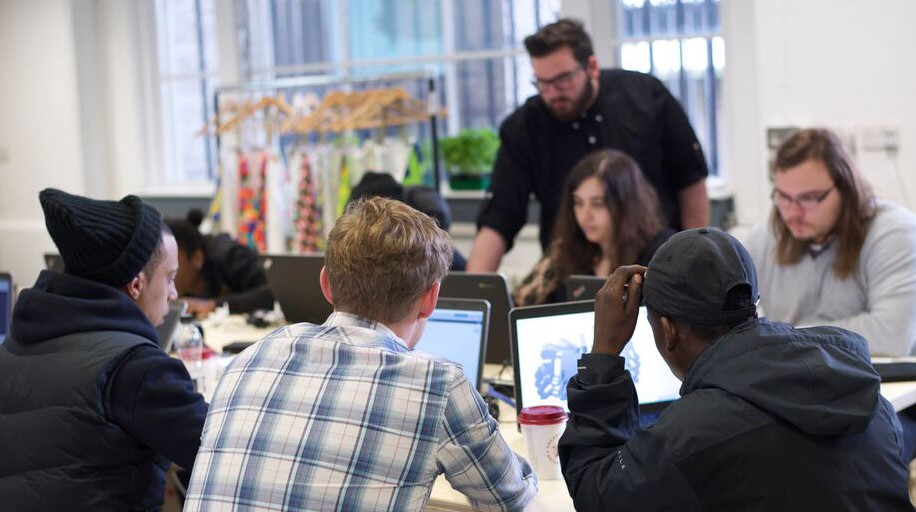
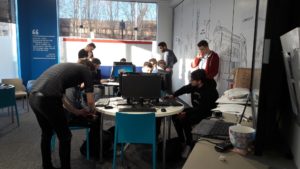 Split into two sessions, the Taster and Industry days’ aim is to introduce young people to digital technology in fun and creative ways: from creating prototypes for 3D printers, to basic games design, filming and editing in the morning; to learning how to code using micro-bit mini-computers in the afternoon in #generationcode – linking coding to real-world issues, with activity themed around Science and Technology, Health and Wellbeing, Personal and Global Citizenship and Creative Arts.
Split into two sessions, the Taster and Industry days’ aim is to introduce young people to digital technology in fun and creative ways: from creating prototypes for 3D printers, to basic games design, filming and editing in the morning; to learning how to code using micro-bit mini-computers in the afternoon in #generationcode – linking coding to real-world issues, with activity themed around Science and Technology, Health and Wellbeing, Personal and Global Citizenship and Creative Arts.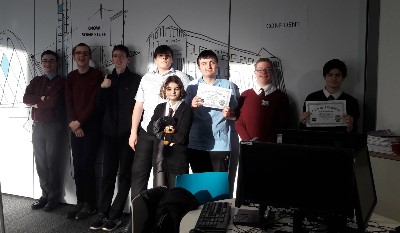 Cath Mitchell, Volunteers Executive and Sean Dimeo, Fundraising Administrator said, “Without support from Digital Xtra Fund, this project would not have been possible. Their backing has allowed us to recruit and further train our talented young mentors, as well as attract digital technology entrepreneurs to deliver stimulating activity sessions. Furthermore, with their support, we have been able to secure a supply of micro:bits for use after the project’s conclusion. This will allow young people to continue to hone their coding skills at their own pace and pass on this knowledge to peers. Thank you to Digital Xtra Fund for their support”
Cath Mitchell, Volunteers Executive and Sean Dimeo, Fundraising Administrator said, “Without support from Digital Xtra Fund, this project would not have been possible. Their backing has allowed us to recruit and further train our talented young mentors, as well as attract digital technology entrepreneurs to deliver stimulating activity sessions. Furthermore, with their support, we have been able to secure a supply of micro:bits for use after the project’s conclusion. This will allow young people to continue to hone their coding skills at their own pace and pass on this knowledge to peers. Thank you to Digital Xtra Fund for their support”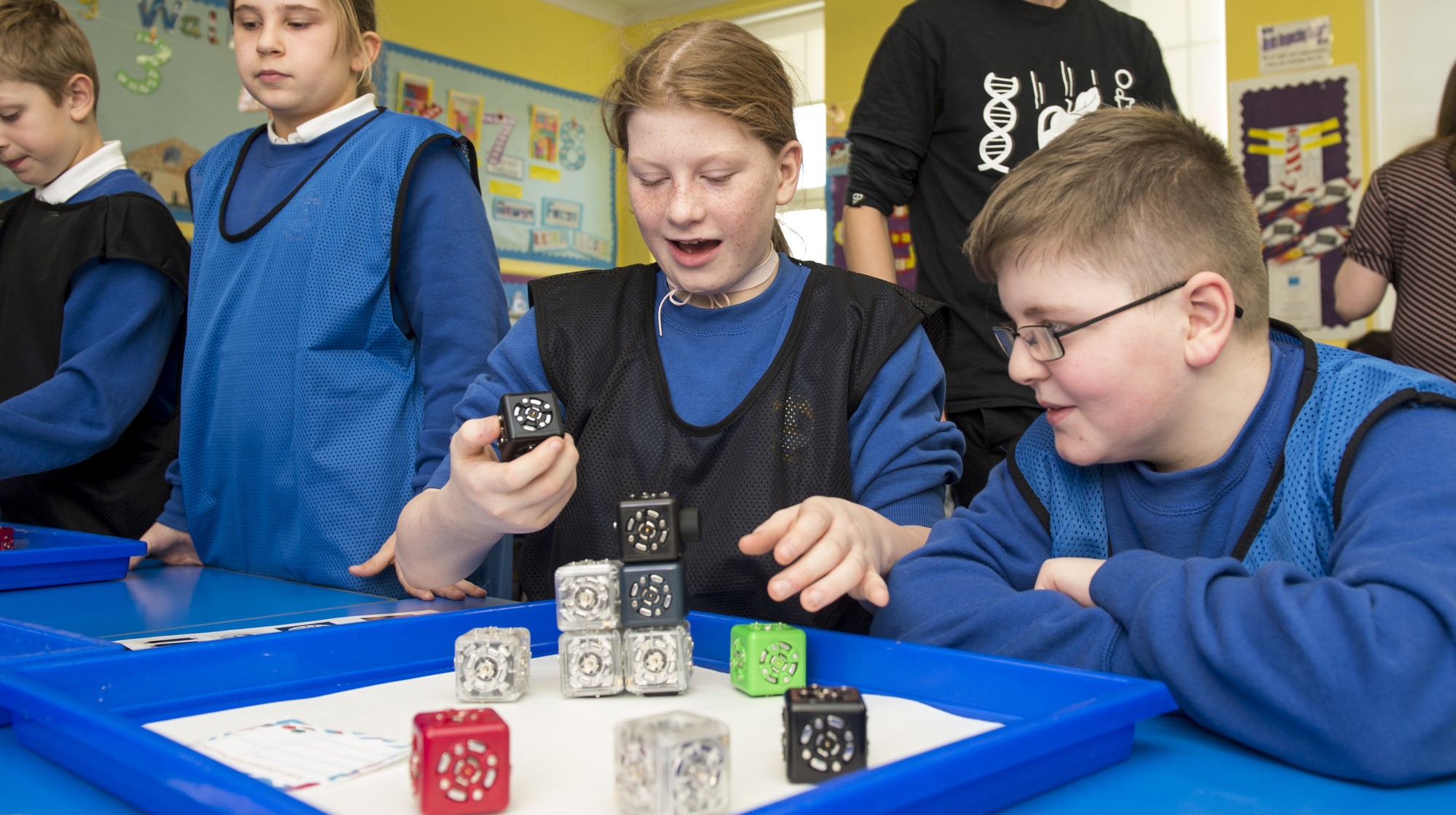
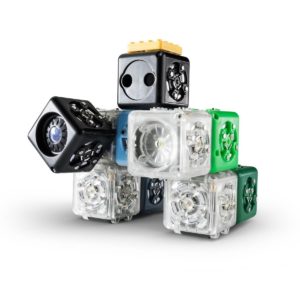
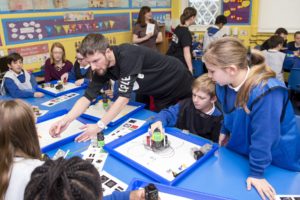 Robo Constructors is a fun, fast-moving workshop where pupils become mini-robot engineers, exploring open ended challenges to create their own novel, wacky and useful robots! Using
Robo Constructors is a fun, fast-moving workshop where pupils become mini-robot engineers, exploring open ended challenges to create their own novel, wacky and useful robots! Using 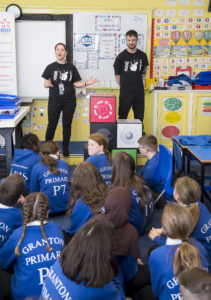 Joan Davidson, Head of Education at Edinburgh International Science Festival, spoke about how Digital Xtra Fund is helping Generation Science to engage and inspire more young people and their teachers, “Generation Science is all about supporting the provision of science education in Scottish primary schools. We do this with a team of incredibly enthusiastic science communicators whose energy and passion for delivering engaging STEM activities inspires young learners and brings technology to life in the classroom. Working with organisations such as Digital Xtra Fund enables us to reach young people across Scotland wherever they may be. With the adoption of digital as part of the definition of STEM in the STEM education and training strategy for Scotland, it is vital that our young learners and their teachers have access to inspiring and engaging activities that not only cut across the curriculum but provide bridges to life outside the classroom and the wider world of work. There are many varied opportunities for our young people to engage and develop their digital skills and we will continue to support the development of this element of young people’s learning.”
Joan Davidson, Head of Education at Edinburgh International Science Festival, spoke about how Digital Xtra Fund is helping Generation Science to engage and inspire more young people and their teachers, “Generation Science is all about supporting the provision of science education in Scottish primary schools. We do this with a team of incredibly enthusiastic science communicators whose energy and passion for delivering engaging STEM activities inspires young learners and brings technology to life in the classroom. Working with organisations such as Digital Xtra Fund enables us to reach young people across Scotland wherever they may be. With the adoption of digital as part of the definition of STEM in the STEM education and training strategy for Scotland, it is vital that our young learners and their teachers have access to inspiring and engaging activities that not only cut across the curriculum but provide bridges to life outside the classroom and the wider world of work. There are many varied opportunities for our young people to engage and develop their digital skills and we will continue to support the development of this element of young people’s learning.” Generation Science is one of 11 initiatives Digital Xtra Fund is supporting in 2018, which will introduce over 3,200 young people to high-level computing skills. This is made possible by our sponsors and funders who contribute to our goal of giving every young person in Scotland access to a digitally creative activity.
Generation Science is one of 11 initiatives Digital Xtra Fund is supporting in 2018, which will introduce over 3,200 young people to high-level computing skills. This is made possible by our sponsors and funders who contribute to our goal of giving every young person in Scotland access to a digitally creative activity. 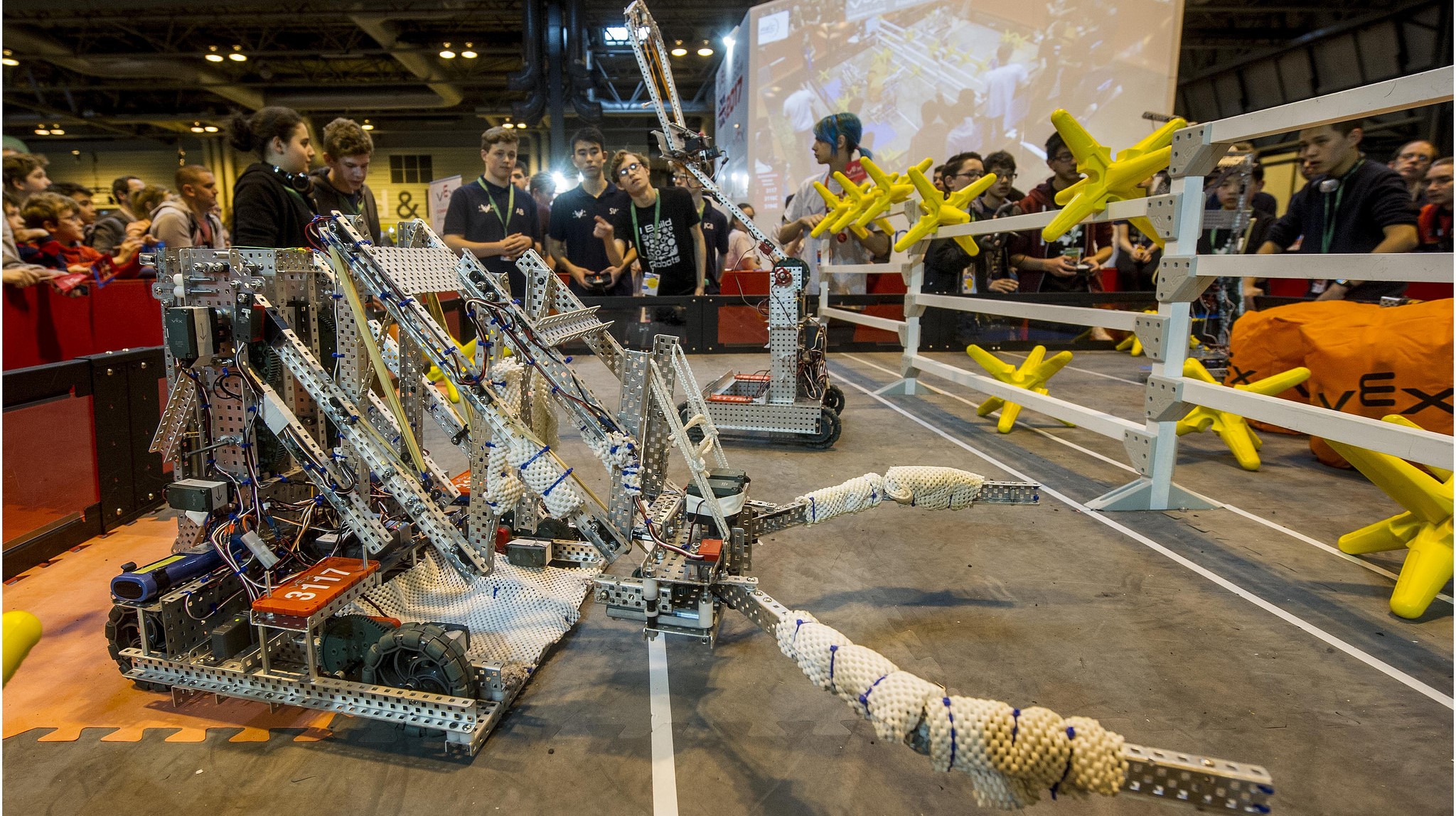
 Inspiring young people into STEM using robotics, coding, and teamwork is the focus of the VEX Robotics Competition, an extracurricular programme where student teams design, build, and code robots to compete in an exciting global engineering challenge set annually by the Robotics Education & Competition Foundation based in Greenville, Texas. The modular robot kits and variable challenges also promote skills such as creativity, problem-solving, and computational thinking while teaching students about the design process.
Inspiring young people into STEM using robotics, coding, and teamwork is the focus of the VEX Robotics Competition, an extracurricular programme where student teams design, build, and code robots to compete in an exciting global engineering challenge set annually by the Robotics Education & Competition Foundation based in Greenville, Texas. The modular robot kits and variable challenges also promote skills such as creativity, problem-solving, and computational thinking while teaching students about the design process.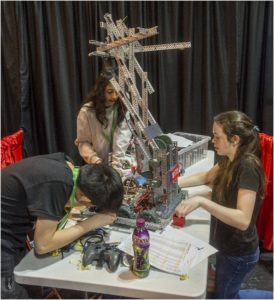 The study of robotics links to all facets of STEM and New College Lanarkshire have developed an exciting programme that encourages young people to learn through exploration via hands-on, problem-based learning experiences. This year, 38 young people aged 12-16 from Lanarkshire have taken on the challenge of becoming robot designers adopting the roles of computer programmers, CAD designers, engineers, and robot pilots.
The study of robotics links to all facets of STEM and New College Lanarkshire have developed an exciting programme that encourages young people to learn through exploration via hands-on, problem-based learning experiences. This year, 38 young people aged 12-16 from Lanarkshire have taken on the challenge of becoming robot designers adopting the roles of computer programmers, CAD designers, engineers, and robot pilots.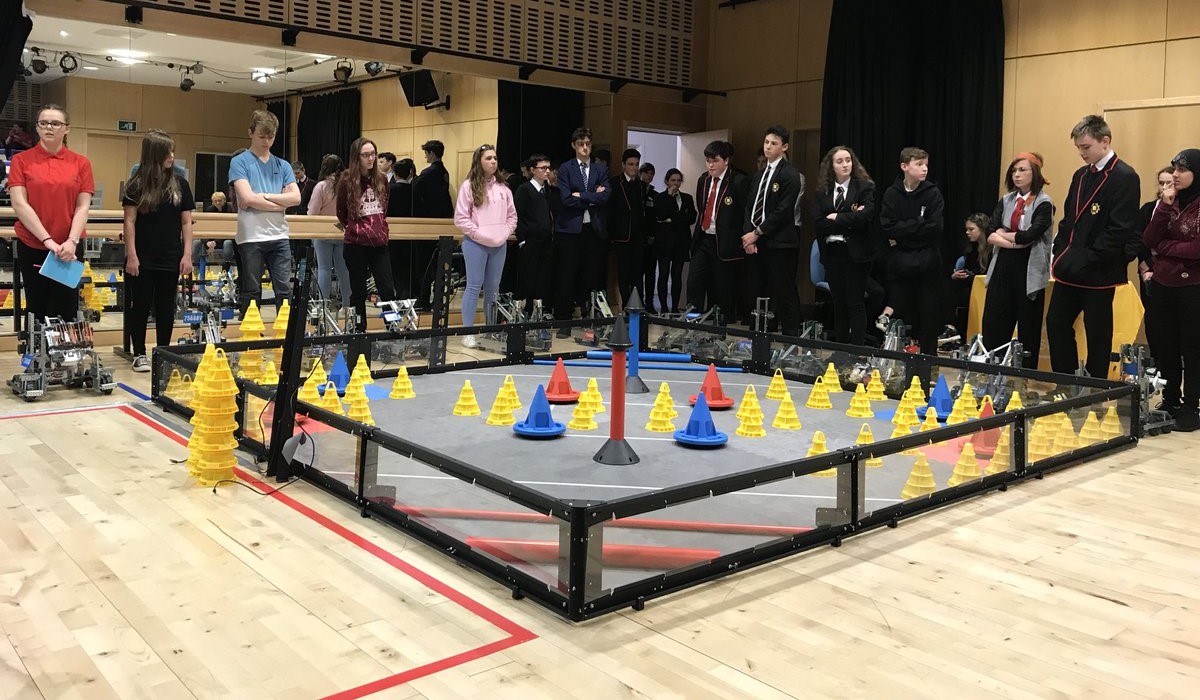 These young robot-engineers recently got a chance to show off their creations and celebrate their new digital skills at the VEX Robotics Scottish Regional Finals on 2 February at the New College Lanarkshire Motherwell Campus. Teams competed in
These young robot-engineers recently got a chance to show off their creations and celebrate their new digital skills at the VEX Robotics Scottish Regional Finals on 2 February at the New College Lanarkshire Motherwell Campus. Teams competed in 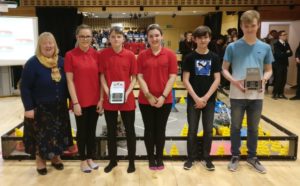 Koala-T were also winner of the Regional Design Award, judged this year by Digital Xtra Fund. The Design Award is presented to the team that best demonstrates an organised and professional approach to the design process, project and time management, and team organisation. During the robot’s design process teams must maintain an Engineering Notebook, documenting the progression of their robot from initial idea through to final testing. This helps the teams better understand the engineering design process while also practicing a variety of real life skills that will benefit in their academic and professional futures. As well as competing in the UK National Championships, this win also gives Koala-T opportunity to compete for the Design Award at the National level too!
Koala-T were also winner of the Regional Design Award, judged this year by Digital Xtra Fund. The Design Award is presented to the team that best demonstrates an organised and professional approach to the design process, project and time management, and team organisation. During the robot’s design process teams must maintain an Engineering Notebook, documenting the progression of their robot from initial idea through to final testing. This helps the teams better understand the engineering design process while also practicing a variety of real life skills that will benefit in their academic and professional futures. As well as competing in the UK National Championships, this win also gives Koala-T opportunity to compete for the Design Award at the National level too!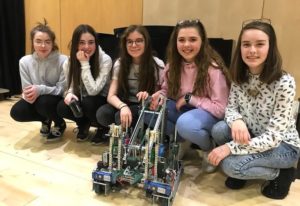 Encouraging more young women to engage in STEM and computing science is a key aim of this initiative overall. Evidence of New College Lanarkshire’s success is apparent simply by the number of young women taking part, but it is exemplified by Power of 5 – the first all-female team from Airdrie Academy who also reached the UK Finals last year and were runner-up for the Design Award at this year’s Regional finals with their robot ‘KJ’. The team named their robot KJ after the iconic NASA mathematician, Katherine Johnson, whose computations have influenced every major space program from the Mercury missions through to the Space Shuttle, and who was the focus of 2017 film
Encouraging more young women to engage in STEM and computing science is a key aim of this initiative overall. Evidence of New College Lanarkshire’s success is apparent simply by the number of young women taking part, but it is exemplified by Power of 5 – the first all-female team from Airdrie Academy who also reached the UK Finals last year and were runner-up for the Design Award at this year’s Regional finals with their robot ‘KJ’. The team named their robot KJ after the iconic NASA mathematician, Katherine Johnson, whose computations have influenced every major space program from the Mercury missions through to the Space Shuttle, and who was the focus of 2017 film 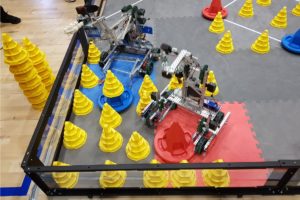 Unfortunately, disruption across UK train services caused by the “Beast from the East” winter storm has meant Koala-T and Jamie and the Generics are unable to attend the UK National Championships later this week in Telford. Both teams are understandably disappointed as they would have loved to attend. However, Digital Xtra Fund would still like to congratulate both teams on a job well done at the Scotland event and best of luck in the future. You can follow
Unfortunately, disruption across UK train services caused by the “Beast from the East” winter storm has meant Koala-T and Jamie and the Generics are unable to attend the UK National Championships later this week in Telford. Both teams are understandably disappointed as they would have loved to attend. However, Digital Xtra Fund would still like to congratulate both teams on a job well done at the Scotland event and best of luck in the future. You can follow 
